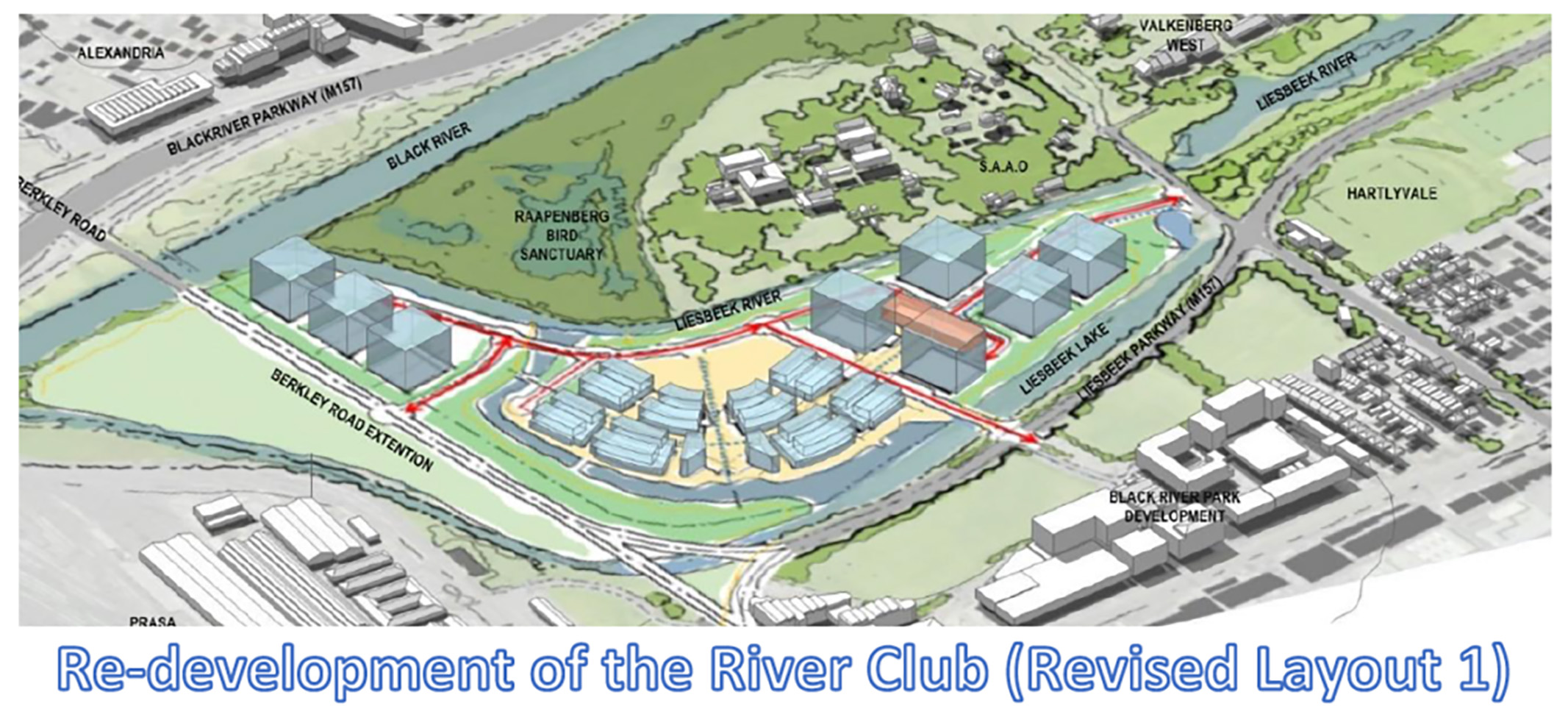“The features sound impressive when you read about them. But are they sufficient for the First Nation groups?” asked Western Cape Deputy Judge President Patricia Goliath on the last day of a three-day hearing to interdict the Liesbeek property development, where the anchor tenant will be retail giant Amazon.
Final arguments were heard in the case filed by the Goringhaicona Khoi Khoin Indigenous Traditional Council (GKKITC) and Observatory Civic Organisation, who said the construction, which has now reached its second story, is being built on sacred land.
The floodplain where the multi-purpose R4.5-billion development is underway is an area of historical significance as it is where resistance was mounted by the indigenous Khoisan people against Portuguese colonisers. It has become a space for rituals and spiritual connection for the indigenous group.

Proposed design: Architectural design images. (Supplied)
While the historical significance is acknowledged by all parties in the case, including an indigenous group in support of the development called the First Nations Collective, usage of the land and how it can be recognised as a place of significance has been up for debate.

Architectural design images. (Supplied)
“There is only one suggestion to advance the heritage [of the indigenous people] and that is the development,” said Ron Paschke, the City of Cape Town’s advocate, adding that the development would improve biodiversity. “It advances the heritage and protects it in a way that it has never before.”
However, Deputy Judge Goliath has stated in court that no price can be placed on protection of heritage and cultural values.
Liesbeek Leisure Property Trust (LLPT), which is heading the development, aims to have facilities that acknowledge the history of the space, such as a cultural centre, an indigenous garden for indigenous food and medicinal plants, eco-trails and an amphitheatre for cultural song and dance.
Tauriq Jenkins, high commissioner of the GKKITC, told Daily Maverick, “There are certain things in our lives as people that we should have the right to hold sacred and we should have the right to say that, actually, this is something that we have the right to preserve and to keep intact. To justify 150,000 square metres of concrete block on a sacred terrain in the name of the San and Khoi is an injustice. And that cannot be allowed to happen.”
The Western Cape provincial government, the City of Cape Town and LLPT have argued in court that the development’s facilities will be an improvement on the current condition of the Liebeek and Black Rivers. The rivers are heavily polluted and are part of the River Club golf course, private property that indigenous communities do not have open access to.
Michelle Couzyn-Rademeyer, group, general and legal counsel for LLPT, told Daily Maverick, “We just feel that we were happy with the proceedings and confident that the core facts of the case had been heard and were approved by all relevant authorities. It will be enormously beneficial and has the support of the First Nation. So we believe all the advocates have responded and set up the case.”
Couzyn-Rademeyer added that it would be expensive to stop construction while the matter is being reviewed. She said if the interdict was successful bank financing could be pulled, there would be job losses, a possible loss of investment into the city and possible loss of employment opportunities for indigenous communities at the new facilities.
Amazon has, according to the trust’s lawyers, said it will not wait out further delays and could abandon the anchor tenant position should the interdict proceed.

Members of the indigenous community burn impepho outside the Western Cape High Court before a hearing that seeks to end the destruction of a significant part of their culture. (Photo: Onke Ngcuka)
Kai/aoab, a member of the GKKITC indigenous community, who has staged a protest in front of the High Court dressed in traditional attire, told Daily Maverick many leaders and corporations had made empty promises to his community.
“How many of our people are at that site?” Kai/aoab asked. “It’s not our people that are gaining employment there, it’s not the first nations.
“I have to preserve this legacy so I can tell it to the generations coming because of the land dispossession that my nation has gone through. If the judge were to go against our application then we would be doubly dispossessed of our land.”
Kai/aoab said he was now classified as “coloured” and had lost his heritage. Preserving the Liesbeek property in its natural state was critical for future generations of his people to know of their history.
First Nations Collective chair, Zenzile Khoisan, who backs the LLPT development, maintains that his group is the established and authoritative custodian of the Liesbeek area.

Construction equipment arrives at the River Club, 12 November 2021. (Photo: Gallo Images / Brenton Geach)
“We believe justice will be served in the interests of those who truly represent the interests of the First Nations,” Khoisan said. “So today, here in front of this court, we declare that we have won this matter — all things being even and justice being served. We know, for us today, and for the seven generations into the future for whom we are responsible, we have established very significant precincts.”
Participation in the consultation process has also been up for debate, with one side arguing that they were excluded and the other (the GKKITC) arguing that their withdrawal due to disagreement over the development did not mean they did not want to be consulted.
Judgment on the interdict is awaited and the judge has said it is being considered urgently. DM/OBP
[hearken id=”daily-maverick/9041″]



















 Become an Insider
Become an Insider
Comments - Please login in order to comment.